|
|
|
Sort Order |
|
|
|
Items / Page
|
|
|
|
|
|
|
| Srl | Item |
| 1 |
ID:
127600
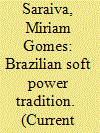

|
|
|
|
|
| Publication |
2014.
|
| Summary/Abstract |
Over the past decade, amid growing international fragmentation and declining US hegemony, Brazil has assertively expanded its participation in multilateral forums as part of a diplomatic strategy that envisions a reformulation of international institutions. At the same time, Brazil has also worked on building a leadership role within South America. These global and regional aims continue to shape the country's use of soft power. Indeed, soft power-defined by the political scientist Joseph S. Nye Jr. as influencing the behavior of others via attraction or persuasion rather than coercion or payment-is nothing new in Brazil's international dealings. Since the early 1900s, the nation has used such a strategy under different labels in conjunction with two beliefs central to its foreign policy: the need to build and assure Brazil's autonomy in its development strategy and foreign policy choices, and the desire to raise its global political profile
|
|
|
|
|
|
|
|
|
|
|
|
|
|
|
|
| 2 |
ID:
127592
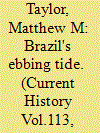

|
|
|
|
|
| Publication |
2014.
|
| Summary/Abstract |
Brazil is in a funk. The past year has brought violent protests, a new wave of corruption scandals, and wariness about the country's economic future. Former President Luiz Inácio Lula da Silva was known for his cheerful, tireless repetition of the message that "never before in the history of this country" had Brazil
accomplished so much. The contrast with his handpicked successor, Dilma Rousseff, was epitomized at the final match of the Confederations Cup, a major soccer tournament in June 2013, when Rousseff visibly stiffened as the crowd loudly booed her.
|
|
|
|
|
|
|
|
|
|
|
|
|
|
|
|
| 3 |
ID:
127616
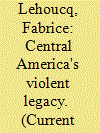

|
|
|
|
|
| Publication |
2014.
|
| Summary/Abstract |
Armed conflict liquidated Central America's dictatorships by the end of the twentieth century. Only Costa Rica was democratic when a wave of civil wars broke out in the 1970s; by the mid-1990s, every country on the isthmus had replaced dictators or military juntas with elected presidents and legislators. Every nation in the region now allows adults at least 18 years old (or 16, in Nicaragua) to cast ballots in regularly scheduled elections
|
|
|
|
|
|
|
|
|
|
|
|
|
|
|
|
| 4 |
ID:
127591
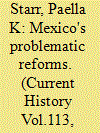

|
|
|
|
|
| Publication |
2014.
|
| Summary/Abstract |
President Enrique Peña Nieto's first year in office (he was inaugurated in December 2012) was impressive, but also disappointing. The new administration's legislative achievements, including a series of long-awaited economic reforms, were striking in both number and content. Yet these accomplishments were accompanied by severely compromised fiscal and political-electoral reforms, an absence of anticorruption legislation, a sharp economic downturn caused mainly by government missteps, and a lack of sustained policy attention to the country's security situation. For the Mexican public, these last two failings weigh much more heavily on their everyday lives than the potential benefits from reforms approved by politicians who rarely seem to legislate with the citizenry in mind. Opinion polls show the lowest public support for any presidential administration in decades.
|
|
|
|
|
|
|
|
|
|
|
|
|
|
|
|
| 5 |
ID:
127604
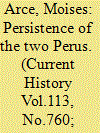

|
|
|
|
|
| Publication |
2014.
|
| Summary/Abstract |
Peru is poised for a brighter future. Since Alberto Fujimori's decade-long presidency ended in 2000, politics has become more liberalized, and the press livelier and freer. At the same time, the country has embarked on an important process of decentralization, allowing newly created regional governments a greater role in public policy, thus placing constraints on executive power. The extraction of natural resources, following the economic liberalization policies of the Fujimori era, has contributed to an impressive economic expansion, aided by record-high commodity prices and the growing Chinese demand for raw materials.
|
|
|
|
|
|
|
|
|
|
|
|
|
|
|
|
| 6 |
ID:
127609
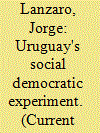

|
|
|
|
|
| Publication |
2014.
|
| Summary/Abstract |
At the dawn of the twenty-first century, a historic change took place in Latin America. Through democratic elections, left-leaning governments were established in a large group of countries (Argentina, Bolivia, Brazil, Chile, Ecuador, El Salvador, Nicaragua, Paraguay, Peru, Venezuela, and Uruguay). Even
if this turn to the left has the nature of a "wave," the governments that are part of it show a marked diversity. Among them, the new populists (Venezuela, Bolivia, Ecuador) stand out, as well as the Kirchners (Néstor and then his widow, Cristina), in Argentina, who offered a progressive version of the versatile Peronist movement. These governments have their peculiarities, no doubt, but they are rooted in the old trunk of populism, which has been a recurrent political phenomenon in Latin America during different historical stages and with different ideological leanings, from left to right.
|
|
|
|
|
|
|
|
|
|
|
|
|
|
|
|
|
|
|
|
|